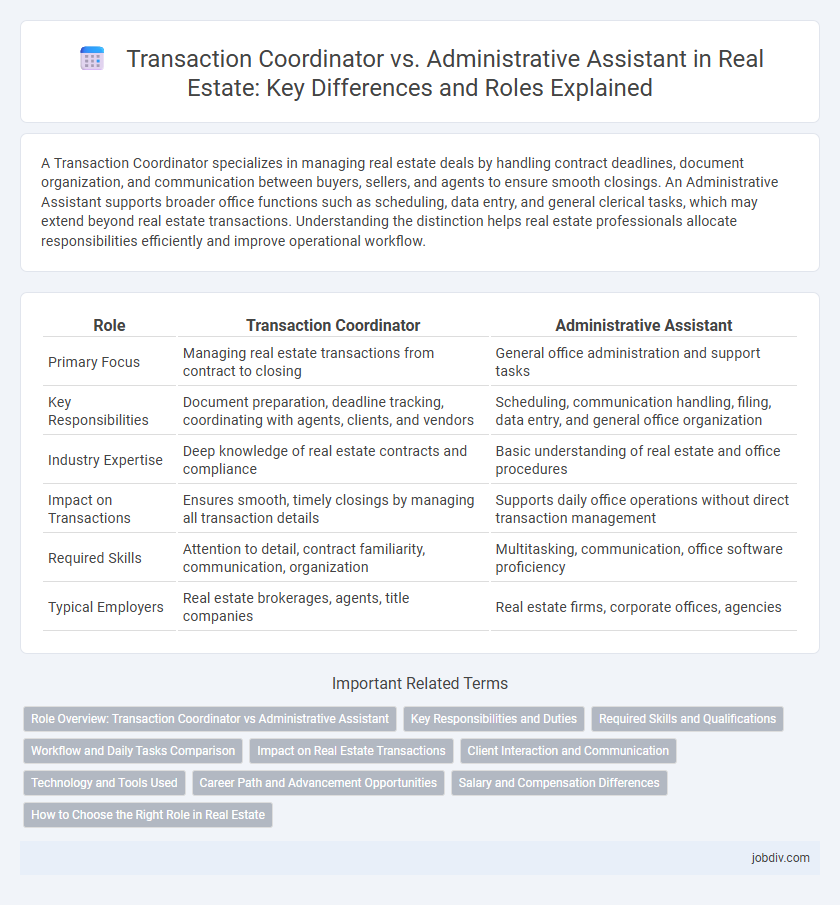A Transaction Coordinator specializes in managing real estate deals by handling contract deadlines, document organization, and communication between buyers, sellers, and agents to ensure smooth closings. An Administrative Assistant supports broader office functions such as scheduling, data entry, and general clerical tasks, which may extend beyond real estate transactions. Understanding the distinction helps real estate professionals allocate responsibilities efficiently and improve operational workflow.
Table of Comparison
| Role | Transaction Coordinator | Administrative Assistant |
|---|---|---|
| Primary Focus | Managing real estate transactions from contract to closing | General office administration and support tasks |
| Key Responsibilities | Document preparation, deadline tracking, coordinating with agents, clients, and vendors | Scheduling, communication handling, filing, data entry, and general office organization |
| Industry Expertise | Deep knowledge of real estate contracts and compliance | Basic understanding of real estate and office procedures |
| Impact on Transactions | Ensures smooth, timely closings by managing all transaction details | Supports daily office operations without direct transaction management |
| Required Skills | Attention to detail, contract familiarity, communication, organization | Multitasking, communication, office software proficiency |
| Typical Employers | Real estate brokerages, agents, title companies | Real estate firms, corporate offices, agencies |
Role Overview: Transaction Coordinator vs Administrative Assistant
A Transaction Coordinator in real estate manages all contract-related details, ensuring timely document submission, compliance, and communication between buyers, sellers, agents, and escrow companies. An Administrative Assistant supports overall office operations, handling scheduling, data entry, and client communications, but typically lacks specialized knowledge of real estate transactions. The key distinction lies in the Transaction Coordinator's focus on transaction flow and closing procedures versus the Administrative Assistant's broader clerical responsibilities.
Key Responsibilities and Duties
Transaction Coordinators specialize in managing real estate contract processes, ensuring deadlines, documentation, and compliance requirements are met throughout each property transaction. Administrative Assistants provide broader office support, including calendar management, client communication, and general clerical tasks that facilitate smooth daily operations in a real estate office. Both roles require organizational skills, but Transaction Coordinators focus on specific transaction milestones while Administrative Assistants handle diverse administrative functions.
Required Skills and Qualifications
Transaction Coordinators require proficiency in real estate contract management, attention to detail, and strong communication skills to handle deadlines and documentation accurately. Administrative Assistants typically need broader organizational abilities, proficiency in office software, calendar management, and multitasking skills to support overall office operations. Both roles benefit from knowledge of real estate terminology and local regulations, but Transaction Coordinators often require specific experience with transaction software and compliance protocols.
Workflow and Daily Tasks Comparison
Transaction Coordinators in real estate specialize in managing contract deadlines, coordinating with clients, agents, and escrow companies to ensure smooth closings, while Administrative Assistants handle broader office duties, such as calendar management, answering calls, and preparing marketing materials. The daily workflow of a Transaction Coordinator revolves around tracking transaction progress, verifying document accuracy, and facilitating communication between all involved parties, contrasting with the Administrative Assistant's focus on general organizational support and clerical tasks. Real estate teams benefit from the Transaction Coordinator's niche expertise in contract compliance, whereas Administrative Assistants provide versatile operational assistance.
Impact on Real Estate Transactions
A Transaction Coordinator streamlines real estate transactions by managing contract deadlines, coordinating with buyers, sellers, and agents to ensure smooth closings, which directly reduces delays and legal risks. An Administrative Assistant supports the office with document preparation, scheduling, and communication, but lacks the specialized focus on compliance and transaction-specific processes. Employing a dedicated Transaction Coordinator enhances transaction efficiency and client satisfaction, ultimately accelerating deal closures and minimizing errors in real estate operations.
Client Interaction and Communication
A Transaction Coordinator in real estate specializes in managing client communication by ensuring all contract deadlines and documentation are clearly conveyed and adhered to, enhancing transaction efficiency. In contrast, an Administrative Assistant primarily supports internal office tasks with limited direct client interaction, focusing on scheduling and data management. Effective client communication from Transaction Coordinators leads to improved client satisfaction and smoother transaction processes.
Technology and Tools Used
Transaction Coordinators utilize specialized real estate transaction management software like Dotloop, Skyslope, and TransactionDesk to streamline document processing, compliance tracking, and deadline management. Administrative Assistants often rely on broader office productivity tools such as Microsoft Office Suite, Google Workspace, and basic CRM platforms but lack access to niche transaction-specific technology. The advanced tools employed by Transaction Coordinators enhance efficiency and accuracy in closing real estate deals compared to the more general administrative software.
Career Path and Advancement Opportunities
Transaction Coordinators in real estate specialize in managing contract deadlines, document preparation, and compliance, often leading to roles such as Broker Assistant or Office Manager with increased industry-specific expertise. Administrative Assistants handle broader office tasks across various departments, enabling career growth into general management, operations, or human resources within or outside real estate firms. Real estate professionals seeking focused advancement typically prefer Transaction Coordinator roles for their direct impact on sales processes and potential to build regulatory and transactional expertise.
Salary and Compensation Differences
Transaction coordinators in real estate typically earn between $40,000 and $60,000 annually, reflecting their specialized role in managing contract details and deadlines. Administrative assistants usually have a broader scope of general office duties and earn a slightly lower salary range of $35,000 to $50,000 per year. Compensation for transaction coordinators often includes performance bonuses tied to successful closings, while administrative assistants may receive standard benefits without such incentives.
How to Choose the Right Role in Real Estate
Choosing the right role between a Transaction Coordinator and an Administrative Assistant in real estate depends on the specific needs of the brokerage or agent. Transaction Coordinators specialize in managing contracts, deadlines, and compliance throughout the closing process, ensuring smooth and timely transactions. Administrative Assistants provide broader support, handling general office tasks, client communication, and calendar management, making them ideal for agents requiring comprehensive administrative assistance.
Transaction Coordinator vs Administrative Assistant Infographic

 jobdiv.com
jobdiv.com